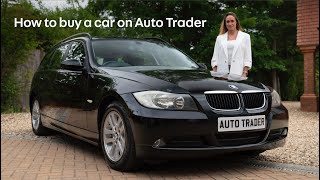LATEST SECURITY ANNOUNCEMENT
Scam Alert for Private Sellers
The Vehicle Safe Trading Advisory Group (VSTAG) are warning private sellers to be on the lookout for potential buyers who turn up to an arranged viewing with the intention of obtaining the vehicle at a lower price by tampering with the vehicle
Report an issue
Think you’ve been a victim of fraud or spotted something we should know about?
Security advice
How to buy and sell vehicles safely
Buying or selling a car should be a pleasant, hassle-free experience‚ and at Auto Trader we do everything we can to make sure that's the case. Our handy hints and tips will ensure you stay safe online, whether you're buying or selling a car.
Safety advice
Latest Security Announcements
Staying safe on Auto Trader
We’ve partnered with VSTAG (the Vehicle Safe Trading Advisory Group) to provide the following checklists so you have a hassle-free experience when buying or selling a vehicle.
Buying a vehicle checklist

1. Check the documents
Always check the vehicle registration number (VRN), vehicle identification number (VIN), engine number, and colour, match what’s in the vehicle’s V5C registration document (logbook).A genuine V5C document will have a DVLA watermark running through it. You should also check its MOT history if it’s more than three years old.
2. Know your rights
If you buy a vehicle from a dealership, you’ll be covered by the Consumer Rights Act.If you buy from a private seller, you won’t have the same level of protection, but the vehicle must still match the advert description otherwise you could have a claim under the Misrepresentation Act.
3. Get a vehicle history check
A vehicle history check will tell you if the vehicle has been recorded as stolen, scrapped, written-off, or has outstanding finance. If it has an outstanding finance balance, contact the seller as this is often settled on sale of the vehicle. Be aware that if you buy the vehicle with outstanding finance, the finance company will remain the legal owner until the loan is repaid in full. It is also worth checking the MOT data on .gov which will give you an indication of any repairs or advisories from previous MOTs. It also shows the mileage recorded during these inspections so you can compare them to what is displayed on the car’s dash
4. Check the price
If the price is too good to be true, it probably is, and it could be a sign of fraud. If it’s significantly below market, be cautious. Check the advert carefully or ask the seller if you’re unsure about its pricing. There may be underlying reasons why it’s a low price.
5. Be cautious sending money before you’ve seen it
Most fraudulent sellers will try to persuade you to transfer money before you’ve seen the vehicle. Often, they will insist on communicating via email rather than phone. Always check the vehicle and its documents in person before handing over any money. If they request a deposit, don’t pay more than you can risk losing. Always confirm with the seller in writing that they will refund the deposit if you decide not to buy the vehicle. Auto Trader works with a select number of dealers who provide a reservations service and home delivery. If any issues arise, you may be protected under the distance selling regulations. Visit Citizens Advice to learn more.
6. Take it for a test drive
This should always be done from the seller’s premises or their home never let them meet you halfway. You should also make sure you’re insured before getting behind the wheel. If you are familiar with engines or know someone who is, it’s a good idea to inspect under the bonnet for signs of wear and tear that are not in line with the mileage on the car. It’s also an opportunity to take note of the condition of the interior of the vehicle as this can be indicative of the usage of the car being in keeping with the mileage shown on the vehicle.
7. Don’t carry large sums of cash
Where possible, go to the bank with the seller. If you’re buying from a dealer, you have the option to buy on finance. If something goes wrong and the dealer won’t fix it, you can go directly to the finance company.
8. Check your insurance
You need to inform your insurer if you’ll be driving a new vehicle. Let them know when you’ll need the new cover to start, or it may be invalid. If your existing policy is coming to an end, you can get a new insurance quote.
Selling a vehicle checklist

1. Get the paperwork ready
You’ll need your V5C vehicle registration document (logbook), service history and MOT certificate. Buyers can view these documents to check the details but never let them take a picture it may be used for fraud.
2. Arrange a viewing
Genuine buyers should want to see the vehicle before making a payment. You should arrange to meet them at your home, never halfway or at their work premises. Ask for their contact details, including a phone number and home address for reassurance. A genuine buyer should be happy to do this.
3. Stay within sight
Never leave a buyer alone with the vehicle or give them the keys, dishonest people may take the opportunity to tamper with the vehicle to haggle you down on the price. If you have a keyless fob, always keep hold of it, even on a test drive. Your personal safety comes first so if you feel uncomfortable at any time, walk away.
4. Join them in a test drive
Always accompany any potential buyers on a test drive and make sure you ask them to bring their driving licence. You should check that they are covered by insurance to help prevent you being liable for damages. Be sure to retain your own insurance policy while you sell the car, even if you’ve bought another vehicle in the meantime.
5. Exchange documents after you’ve received payment
Keep hold of the vehicle, keys and all the documents until the full payment has cleared in your bank account. If you accept a cheque or bankers draft, be aware it can take a few days for these funds to clear.
Online Safety
1. Protect your computer
Keep your computer and security software up to date. Regularly check if there are updates available as these will help reduce the risk of threats entering your computer.
2. Set strong passwords
Use a combination of letters and numbers and avoid using the names of loved ones or other easy-to-guess passwords. Change it regularly and avoid using the same passwords for all your online accounts.
3. Phishing
Fraudsters may send phishing emails in an attempt to access your personal information and login details, such as your username, passwords or financial information. Remember, we will never ever ask you to enter your accounts details via a link in an email or text. Phishing emails can be difficult to spot, so if you receive a suspicious email claiming to be from Auto Trader, please forward it to us at customersecurity@autotrader.co.uk
4. Enter payment details carefully
Check there’s a padlock in the browser window before entering any payment details. The url should also begin with ‘https://’. The ‘s’ stands for ‘secure’. Get in touch with your bank or credit card company immediately if you notice a transaction in your bank statement that you didn’t make.
5. Check the privacy policy
You can read Auto Trader’s privacy policy to understand how we use your personal information. Sites without a privacy policy should be avoided.
- Metropolitan Police Advice - to report crimes,issues and incidents
- DVLA - to contact DVLA if you've bought or sold a vehicle or want to check vehicle details
- Get Safe Online - for advice on how to stay safe online
- Citizens Advice - for advice on what to do if there's a problem with a vehicle you've bought.
- Action Fraud - to report scams and cyber-crime activity
- GOV.UK - for further advice on buying and selling vehicles
Useful links to help you in the buying and selling process
Safety & Security When Buying A Car
Insurance write off categories
Everything you need to know about write off category vehicles, including whether you can buy or sell a write off and what Cat A, Cat B, Cat S and Cat N mean.
How to test drive a used car
Test driving a used car? Here’s what to check, from the vehicle’s exterior to the paperwork.
How do I transfer ownership and tax for a used car I've bought?
Just bought a car? Learn more about the V5C form and how you can fulfil your legal obligation of transferring car ownership.


